英语教学法流派英语 ppt课件
合集下载
教材 外语教学法流派二PPT课件

第6页/共12页
咨询法(The Counseling Learning)
• A Community Language Learning • 又叫“群体商谈法”,是成人学习外语的一种方法。学习者按照教师布置
的任务,分成几组交谈。教师站在学生身后,随时提供帮助,最后把录音 内容重放。群体商谈法也叫人道法,即该法把学生看作整体的人,关心其 情感领域、语言知识和行为技能。 • 示例: 首先问候和自我介绍,接着教师陈述该课的目标及要求,然后学生形成一 个圆圈,用外语进行会话。学生可先用本国语和旁边同学交换信息,教师 站在身后把这段信息交换翻译成外语,然后由学生重复。接着再叫另一个 学生讲,并把话录在录音机里。最后,教师要求学生谈出各自对此学习的 感受。
们的教学行为,清楚地知道自己所处的位置,从而使他们不受以往所接受教育的约束,自主的进行教学。” (Challenge $ Personality)
第9页/共12页
approach,method,technique
• 20世纪60年代,Anthony(1963)按顺序在三个层次上诠释 了approach,method和technique。(approach)“途 径”是最高层次的概念,它是就语言的本质和语言教学的规律 而言的;“方法”(method)是建立在“途径”基础之上的, 是一个按照教学路子制订的整体计划,并指导教学的顺利进行; “技巧”则处于三个层次的最底层,指语言教师在课堂上采用 的具体技巧(可以解决具体的教学问题,实现具体的教学目 标。)(没有解释approach是如何在method中得到体现的, 也没有明确method与technique之间的联系。)
第5页/共12页
主要特点
• 儿童在语言环境中主动感知语言,自觉操作语言,自行纠正改 善语言等一系列获得语言的自然能力(自然规律),听说领先, 读写随后,语境、认知和语言同时获得。
咨询法(The Counseling Learning)
• A Community Language Learning • 又叫“群体商谈法”,是成人学习外语的一种方法。学习者按照教师布置
的任务,分成几组交谈。教师站在学生身后,随时提供帮助,最后把录音 内容重放。群体商谈法也叫人道法,即该法把学生看作整体的人,关心其 情感领域、语言知识和行为技能。 • 示例: 首先问候和自我介绍,接着教师陈述该课的目标及要求,然后学生形成一 个圆圈,用外语进行会话。学生可先用本国语和旁边同学交换信息,教师 站在身后把这段信息交换翻译成外语,然后由学生重复。接着再叫另一个 学生讲,并把话录在录音机里。最后,教师要求学生谈出各自对此学习的 感受。
们的教学行为,清楚地知道自己所处的位置,从而使他们不受以往所接受教育的约束,自主的进行教学。” (Challenge $ Personality)
第9页/共12页
approach,method,technique
• 20世纪60年代,Anthony(1963)按顺序在三个层次上诠释 了approach,method和technique。(approach)“途 径”是最高层次的概念,它是就语言的本质和语言教学的规律 而言的;“方法”(method)是建立在“途径”基础之上的, 是一个按照教学路子制订的整体计划,并指导教学的顺利进行; “技巧”则处于三个层次的最底层,指语言教师在课堂上采用 的具体技巧(可以解决具体的教学问题,实现具体的教学目 标。)(没有解释approach是如何在method中得到体现的, 也没有明确method与technique之间的联系。)
第5页/共12页
主要特点
• 儿童在语言环境中主动感知语言,自觉操作语言,自行纠正改 善语言等一系列获得语言的自然能力(自然规律),听说领先, 读写随后,语境、认知和语言同时获得。
英语教学方法ppt课件
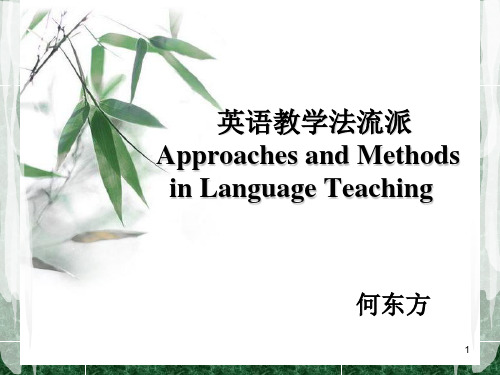
英语教学法流派 Approaches and Methods in Language Teaching
何东方
1
Review The Grammar-Translation Method
Definition: It means to translate from mother tongue to target language.That is to say,the method teaches foreign language with grammar explaination and translation exercise.
电子技术为核心的知识、技术技术密集型产业发展很快。 ➢ 听说法是20世纪40年代末在美国形成的外语教学法。二战期间,美国军
队进驻很多国家,军人急需掌握外语,特别是通过军队外语培训等教学 活动,创立了听说法。 ➢ 20世纪60年代末70年代初,随着另一门新兴学科社会语言学的诞生,社 会语言学家提出了“交际能力”的概念,在外语教学界引起了强烈的反 响,交际教学法学派随即迅速崛起。 ➢ 在交际法的带动下,20世纪70年代还兴起了人文主义教学法,主要包括 沉默法(the silent way)、提示法(suggestopedia)、社区式语言学习 (community language learning)和全身反应教学法(the total physical response method)等新型的外语教学法。这些教学法的共同特点是强调 学生是教学的主体。除了分析学生的需要和学习过程外,还注意学生学 习外语的心理特点,努力创造条件,排除学生学习外语时的心理障碍。 4
2
外语教学简史
一、500年前,
➢ 15世纪以前,在西欧、拉丁语处于主流地位,不仅用于日常口语
何东方
1
Review The Grammar-Translation Method
Definition: It means to translate from mother tongue to target language.That is to say,the method teaches foreign language with grammar explaination and translation exercise.
电子技术为核心的知识、技术技术密集型产业发展很快。 ➢ 听说法是20世纪40年代末在美国形成的外语教学法。二战期间,美国军
队进驻很多国家,军人急需掌握外语,特别是通过军队外语培训等教学 活动,创立了听说法。 ➢ 20世纪60年代末70年代初,随着另一门新兴学科社会语言学的诞生,社 会语言学家提出了“交际能力”的概念,在外语教学界引起了强烈的反 响,交际教学法学派随即迅速崛起。 ➢ 在交际法的带动下,20世纪70年代还兴起了人文主义教学法,主要包括 沉默法(the silent way)、提示法(suggestopedia)、社区式语言学习 (community language learning)和全身反应教学法(the total physical response method)等新型的外语教学法。这些教学法的共同特点是强调 学生是教学的主体。除了分析学生的需要和学习过程外,还注意学生学 习外语的心理特点,努力创造条件,排除学生学习外语时的心理障碍。 4
2
外语教学简史
一、500年前,
➢ 15世纪以前,在西欧、拉丁语处于主流地位,不仅用于日常口语
外语教学法主要流派介绍ppt课件
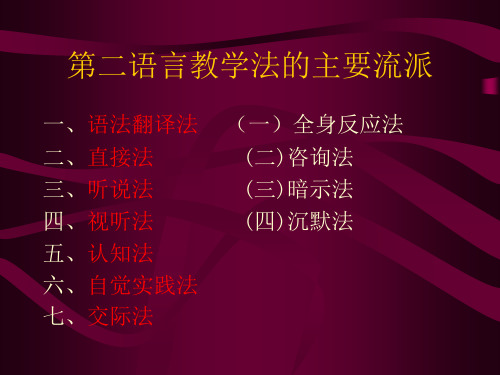
1、功能法产生的时代背景 威尔金斯《意念大纲》
( “Notional Syllabuses”,1978 )
2、功能法的理论基础 1)语言学理论基础 2)心理学理论基础
3、功能法的基本原则 1)以单元---学分体系组织语言教学 2)以功能意念为纲 考虑交际要素 3)教学过程交际化 4)基本目的语和专业目的语兼顾
日常交际 完整的交际活动 1、理论基础
1)语言习得理论 2)社会建构理念 3)课程理论
2、教学原则与特点 原则: 1)言语、情景真实性 2)形式---功能性 3)任务相依性 4)做中学 5)脚手架
特点: 1)目标 2)教师的输入 3)教学技巧与方式 4)教师角色 5)学生角色 6)评价方式与内容
第二语言教学法的主要流派
一、语法翻译法 二、直接法 三、听说法 四、视听法 五、认知法 六、自觉实践法 七、交际法
(一)全身反应法 (二)咨询法 (三)暗示法 (四)沉默法
一、语法翻译法
• 语法翻译法是以语法为基础用母语来教授外 语的一种方法
1、语法翻译法的理论基础 2、语法翻译法的教学原则
1)以语法教学为中心 强调系统语法的学习 2)语言材料的内容以突出某种语法形式为准 3)运用学生母语进行课堂教学 4)以阅读和书面翻译为主 3、对语法翻译法的评价
4、对自觉对比法的评价 附:自觉实践法
七、认知法(cognitive Approach)
• 按照认知规律 • 调动学生的智力潜能 • 努力发现和掌握语言规则 • 创造性地活用语言 • 一种外语教学法体系 • 又称为认知——符号学习理论
1、认知法产生的背景 2、认知法的理论基础 3roach) 1、视听法产生的时代背景 2、视听法的理论基础
1)语言学理论基础
英语教学法(教学PPT)
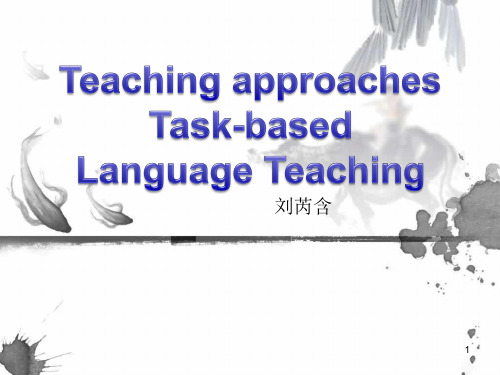
picture .This kind of activity can be called
an exercise-task.
9
Examples of the tasks
• Listening to a weather forecast and deciding what to wear
• Look at a set of pictures and decide what should be done
• Responsing to a party invitation • Completing a banking application • Describing a photograph of one's family
10
The real and unreal tasks in TBLT
• P:Where's the pen ?
3
Definitions of a task
• A task is an activity which requires learners to arrive at an outcome from given information through some process of thought, and which allows teachers to control and regulate that process.Prabhu said.
• Tasks are activities where the target language is used by the learner for a communicative purpose in order to achieve an outcome.Willis said.
英语教学法(教学PPT)

13
• S1:Which do you prefer ,tea or coffee ?
• S2:I prefer coffee./I prefer tea./I like them all./I don't like either .
• The activity is not merely reacting to the questions .But it is not a really task .It depends on the teacher's choices.
• Input:Questionnaire on sleeping habits • Activity:1)Reading questionnaire 2)Asking
and answering questions about sleeping habits • Teacher role:monitor and facilitator;to specify what is regarded as successful completion of the task • Learner role :conversational partner
15
An example in TBLT
• 语言结构:This is ... • 语言功能:指定与介绍(indentification
and introduction) • 1.学生模拟产品讲解员(或商店售货员)向
顾客介绍产品(或商品)简单描述用途:
• This is a thermometer.It is used to measure temperetures.
• 适用于我国英语教学现状的“任务型”教学法
任务是可称之为“中间型”教学任务
• S1:Which do you prefer ,tea or coffee ?
• S2:I prefer coffee./I prefer tea./I like them all./I don't like either .
• The activity is not merely reacting to the questions .But it is not a really task .It depends on the teacher's choices.
• Input:Questionnaire on sleeping habits • Activity:1)Reading questionnaire 2)Asking
and answering questions about sleeping habits • Teacher role:monitor and facilitator;to specify what is regarded as successful completion of the task • Learner role :conversational partner
15
An example in TBLT
• 语言结构:This is ... • 语言功能:指定与介绍(indentification
and introduction) • 1.学生模拟产品讲解员(或商店售货员)向
顾客介绍产品(或商品)简单描述用途:
• This is a thermometer.It is used to measure temperetures.
• 适用于我国英语教学现状的“任务型”教学法
任务是可称之为“中间型”教学任务
外语教学方法与流派综述 ppt课件

--1886年,国际语音协会成立。创制了人类语言语音的统一标引系统— 国际音标,对不同语言的语音系统进行描写和对比。
--1888年提出了六项外语教学原则: 1)“口语优先,先语后文”; 2)要让学生熟悉语音、常用句子和习语; 3)语法教学要用归纳法; 4)要让学生用外语思维; 5)写作练习要先模仿,后创作; 6)笔头翻译应在提高阶段进行。
“方法”倾向于规定相对严格的教学模式和具体操作程序;
“途径”或者“基于......式教学”注重宏观策略的指导和理念的引领,赋予教 师更多的自主权和灵活性。
2020/12/27
7
一. 语法翻译法 Grammar-translation method
教学模式:阅读-分析-翻译-讲解-背诵
→ 老师朗读或带读课文 →逐句讲解、翻译课文 →讲解语法规则 →翻译练习 →互译巩固 →记忆
2020/12/27
16
优点
问题
1. 重视“说”,学生要尽可能地使用目的语进行交 1. 对教师语言水平的要求过高
流;
(聘请不到外籍教师的学校很
困难);
2. 学习内容与现实生活联系紧密; 3. 把课文语篇作为语言学习的基本单位; 4. 要求学生进行模仿学习;
2. 对于大班级来说很难实施;
3. 怎样在更高层次的学习阶 段教授语言? 怎样避免语法
缺少实践机会。
5. 使用方便,教师不需要教学方法等 5. 课堂气氛沉闷。 特别训练
2020/12/27
10
二. 直接法 Direct Method
案例: 课文 Looking at the Map
-- 教师前面挂上一副美国地图; -- 首先学生大声朗读课文,每读一句话,教师就指向地图上相应的地方; -- 读完后的对话: T: Are we looking at a map of Italy? Ss: No. T: Is Canada the country to the south of the United States? Sa: No, Canada isn’t the country to the south of the United States. T: What color is the Rio Grande on the map? Rs:It’s blue. ........ 更多的问题。 --然后学生提问,如:What is the ocean in the west coast? -- 老师运用介词in, on, at, to between问一些关于教室及室内物品的问题 -- 做介词填空练习。在做每道题之前,全班大声朗读,然后再填写答案。
教学法各流派 ppt课件

再者,学生也可以与学生进行对话和讨 论问题。
ppt课件
19
(6)母语的作用: 主张全外语教学, 母语在课堂中不应该使用。
ppt课件
20
(7)教师对待学生错误的态度:
像父母不会过多职责孩子的错误一样, 教师会以不同的形式,讲出正确的语言, 使学生自己纠正自己的错误。
ppt课件
21
3.听说法
交际法又称功能法,或功能-意念法,它的建 立标志着在外语教学中人民开始从只注重语言 形式和结构的教学转向注意语言功能的教学。
ppt课件
41
(2)教师的教学目的:
培养学生外语的交际能力。
“交际能力”是美国社会语言学家海姆斯首先 提出来的一个概念。
他认为一个学习语言的人不但应该有识别句子 是否合乎语法规则的能力和造出合乎语法规则 的句子的能力,还必须懂得怎样恰当地使用语 言,即对不同的对象使用不同的语言,在不同 的场合、不同的时间使用不同的语言。
ppt课件
45
交际法的另一特点是 教师会尽量事业真实性的材料来教学
如外文的报刊和杂志,外国的电台、电 视台和电影。
ppt课件
46
在交际法的课堂里也有语言结构性的活 动。
这一类的活动与听说法的句型操练有相 似的地方,但不完全一样。
因为按照交际法的要求,这一类活动要 设计得很像真正的交际活动。
ppt课件
27
(4)强调哪一方面能力的培养: 强调听、说能力的培养,
课堂大部分的时间都花费在听和说的训 练方面。
ppt课件
28
(5)教师和学生的作用:
教师是学习外语的楷模,而且是课堂活 动的指挥员,
学生是模仿者,他时时都在模仿教师的 语音、语调。
从某个意义上说,听说法是教师起支配 作用的方法。
ppt课件
19
(6)母语的作用: 主张全外语教学, 母语在课堂中不应该使用。
ppt课件
20
(7)教师对待学生错误的态度:
像父母不会过多职责孩子的错误一样, 教师会以不同的形式,讲出正确的语言, 使学生自己纠正自己的错误。
ppt课件
21
3.听说法
交际法又称功能法,或功能-意念法,它的建 立标志着在外语教学中人民开始从只注重语言 形式和结构的教学转向注意语言功能的教学。
ppt课件
41
(2)教师的教学目的:
培养学生外语的交际能力。
“交际能力”是美国社会语言学家海姆斯首先 提出来的一个概念。
他认为一个学习语言的人不但应该有识别句子 是否合乎语法规则的能力和造出合乎语法规则 的句子的能力,还必须懂得怎样恰当地使用语 言,即对不同的对象使用不同的语言,在不同 的场合、不同的时间使用不同的语言。
ppt课件
45
交际法的另一特点是 教师会尽量事业真实性的材料来教学
如外文的报刊和杂志,外国的电台、电 视台和电影。
ppt课件
46
在交际法的课堂里也有语言结构性的活 动。
这一类的活动与听说法的句型操练有相 似的地方,但不完全一样。
因为按照交际法的要求,这一类活动要 设计得很像真正的交际活动。
ppt课件
27
(4)强调哪一方面能力的培养: 强调听、说能力的培养,
课堂大部分的时间都花费在听和说的训 练方面。
ppt课件
28
(5)教师和学生的作用:
教师是学习外语的楷模,而且是课堂活 动的指挥员,
学生是模仿者,他时时都在模仿教师的 语音、语调。
从某个意义上说,听说法是教师起支配 作用的方法。
英语教学法ppt课件

11
英语教学法及其相关学科
Байду номын сангаас理学对教学法的影响
1. 19世纪,20世纪初,心理学不发达 翻译法,直接法主导 2. 行为主义心理学- 听说法三个实践 A 桑代克(美)饿猫取食 B 巴甫洛夫 狗实验 C 斯金纳(美)白鼠实验 3. 认知心理学冲击 乔姆斯基语言学校理论生成
12
Homework
的方法创立的。 主张先开始听,然后才学习讲,然后
再学习读写。 教学原则: 外语是教学的语音,使用外语教授外
语。 只教授日常使用的词汇和句子。 听、说同时教。 强调正确的发音和句子语法的准确性。
22
2.4 20世纪西方的外语教学
1. 直接法有其不足之处 2. 英国的情景法建立 代表教材:《新概念英语》 3. 20世纪60年代后的西方外语教学
抄写一篇短文章,要求字迹工整
13
第二章 英语教学法简史
学习简史的目的: 1. 帮助我们了解不同历史阶段出
现过的外语教学法; 2. 了解这些教学方法出现的历史
背景,以及一种教学方法为什么 和怎么样被另一种教学方法所取 代。
14
2.1 古代和中世纪西方的外语 教学
在欧洲,拉丁语作为通用语延续 了几个世纪
16
拉丁语由教学语言变成一门课程, 地位下降
16至18世纪外语教学的特点: 一些学者和教育家对当时语言教
学实践不满并不断进行改革。
17
代表人物:
A 阿斯堪(英):重视古文教学, 以翻译作为主要教学手段
B 蒙田(法):提出用“自然法” 学习外语(去外国学习语言文化)
C 柯米尼亚斯(捷克):17世纪 最有影响的教育家,主张用“直 觉法”教学
5
常用的英语教学方法
英语教学法及其相关学科
Байду номын сангаас理学对教学法的影响
1. 19世纪,20世纪初,心理学不发达 翻译法,直接法主导 2. 行为主义心理学- 听说法三个实践 A 桑代克(美)饿猫取食 B 巴甫洛夫 狗实验 C 斯金纳(美)白鼠实验 3. 认知心理学冲击 乔姆斯基语言学校理论生成
12
Homework
的方法创立的。 主张先开始听,然后才学习讲,然后
再学习读写。 教学原则: 外语是教学的语音,使用外语教授外
语。 只教授日常使用的词汇和句子。 听、说同时教。 强调正确的发音和句子语法的准确性。
22
2.4 20世纪西方的外语教学
1. 直接法有其不足之处 2. 英国的情景法建立 代表教材:《新概念英语》 3. 20世纪60年代后的西方外语教学
抄写一篇短文章,要求字迹工整
13
第二章 英语教学法简史
学习简史的目的: 1. 帮助我们了解不同历史阶段出
现过的外语教学法; 2. 了解这些教学方法出现的历史
背景,以及一种教学方法为什么 和怎么样被另一种教学方法所取 代。
14
2.1 古代和中世纪西方的外语 教学
在欧洲,拉丁语作为通用语延续 了几个世纪
16
拉丁语由教学语言变成一门课程, 地位下降
16至18世纪外语教学的特点: 一些学者和教育家对当时语言教
学实践不满并不断进行改革。
17
代表人物:
A 阿斯堪(英):重视古文教学, 以翻译作为主要教学手段
B 蒙田(法):提出用“自然法” 学习外语(去外国学习语言文化)
C 柯米尼亚斯(捷克):17世纪 最有影响的教育家,主张用“直 觉法”教学
5
常用的英语教学方法
外语教学法主要流派及其特点PPT课件
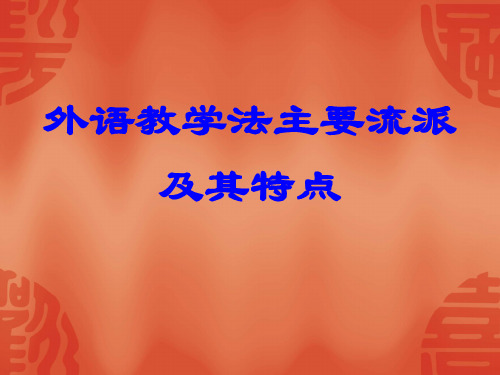
其优点是: 1. 培养学生敢于大胆主动地使用所学语言 进行交谈,口语能力较强; 2. 句型操练对初学者帮助很大,语言规范; 其缺点是: 1. 大量的模仿和机械操练不利于发展学生 的创造性思维; 2. 脱离语言内容和语境的句型操练不利于 学生对语言的灵活运用。 3. 放松读写训练,不利于学生全面发展实 践能力。
其优点是: 1. 有利于培养学生的创造性思维; 2. 在理解语言知识的基础上进行操练, 有利于激发学生的学习兴趣,提高语 言使用的准确性和得体性。 其缺点是: 1. 对语音语调要求不严格; 2. 没有强调培养学生的交际能力。
交际法(Communicative Approach)
交际法也叫功能法(Functional Approach)或意念法 (Notional Approach)。强调以学生为中心,鼓励学生 充分理解和积极参与,体现学生自主的原则。交际学 派认为:语言教学的目的是培养学生使用目的语进行 交际的能力,语言教学的内容不仅要包括语言结构, 还要包括表达各种意念和功能的常用语句。交际法重 视培养学生的语言能力,采用真实、地道的语言材料, 也可从各种书籍或报刊中节选文章或从电影、电视和 广播报道中选取片段等。主张句型加情景来学习语言, 鼓励学生多多接触和使用外语。
翻译法的优点是: 1. 学生语法概念清晰; 2. 阅读能力较强,尤其是遇到长而难的句 子时通过分析句子结构便能理解意思; 3. 有助于培养翻译能力和写作能力。 翻译法的缺点是: 1. 忽视口语教学,学生的语音语调差,不 利于培养学生用外语进行交际的能力; 2. 教学方式单一,学生容易失去兴趣。
直接法(Direct Method)
其缺点是: 1. 排斥母语,使学生对一些抽象和复杂的概念难以理解; 2. 没有明晰的语法解释,对许多语言现象只知其然而不知 其所以然,导致学生说出的话语法错误较多。
英语教学法教程lectu幻灯片PPT
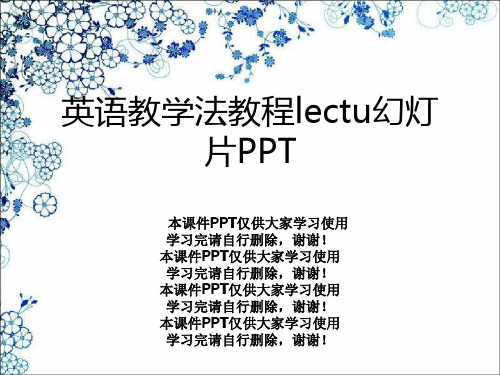
❖ It suggested that language is an intricate rulebased system and a large part of language acquisition is the learning of this system.
Constructivist theory
❖ 4. How can one become a good language teacher?
❖ 5. Try to explain “reflective model〞 in your own words.
Assignment:
语法翻译教学法(grammar-translation method〕 听说教学法 (Audio-lingual method) 交际教学法 (communicative language teaching
❖ As a teaching strategy, scaffolding is defined as the process by which an expert provides temporary support to learners to "help bridge the gap between what the learner knows and can do and what he or she needs to accomplish in order to succeed at a particular learning task.“
❖ It suggested language is a form of behavior and language learning involves the same procedure as an animal is trained to respond to stimuli.
Constructivist theory
❖ 4. How can one become a good language teacher?
❖ 5. Try to explain “reflective model〞 in your own words.
Assignment:
语法翻译教学法(grammar-translation method〕 听说教学法 (Audio-lingual method) 交际教学法 (communicative language teaching
❖ As a teaching strategy, scaffolding is defined as the process by which an expert provides temporary support to learners to "help bridge the gap between what the learner knows and can do and what he or she needs to accomplish in order to succeed at a particular learning task.“
❖ It suggested language is a form of behavior and language learning involves the same procedure as an animal is trained to respond to stimuli.
英语教学法流派英语 ppt课件

In the 16th century ,grammar analysis became the basic way in foreign language teaching in Europe.
Until the 19th century, grammar –translation method became widely approved and used in the whole world.
▪ 2.Through grammar translation, students lacked an active role in the classroom.
2020/12/27
18
The Direct Method
2020/12/27
19
1.Definition 2. Background 3. Theory 4. The principal characteristics 5. Teaching procedure 6. Advantages and disadvantages
2
Grammar-Translation Method
2020/12/27
3
1.Definition 2. Background 3. Theory 4. The principal characteristics 5. Teaching procedure 6. Advantages and disadvantages
3. The native language is overused. There is little use of the target language.
Байду номын сангаас
4. the teacher emphasizes accuracy rather
Until the 19th century, grammar –translation method became widely approved and used in the whole world.
▪ 2.Through grammar translation, students lacked an active role in the classroom.
2020/12/27
18
The Direct Method
2020/12/27
19
1.Definition 2. Background 3. Theory 4. The principal characteristics 5. Teaching procedure 6. Advantages and disadvantages
2
Grammar-Translation Method
2020/12/27
3
1.Definition 2. Background 3. Theory 4. The principal characteristics 5. Teaching procedure 6. Advantages and disadvantages
3. The native language is overused. There is little use of the target language.
Байду номын сангаас
4. the teacher emphasizes accuracy rather
英语教学法流派

二、英语教学法的发展 Developments in English Language Teaching Methodology
(二)直接法 The Direct Method warm-up-direct.doc 1.名词解释 Definition 名词解释 2. 时代背景 Background 3. 理论基础 Theory 4. 主 要 特 点 和 教 学 过 程 The principal characteristics and Teaching procedure
二、英语教学法的发展 Developments in English Language Teaching Methodology
(三)听说法 The Audio-Lingual Method warm-up-audio.doc 1.名词解释 Definition 名词解释 2. 时代背景 Background 3. 理论基础 Theory behaviorism.doc 4.主要特点 主要特点The principal characteristics 主要特点 5. 教学过程 Teaching procedure 6. 主要优缺点 Advantages and disadvantages Advantages-audio.doc
英语教学法流派 Approaches and Methods in Language Teaching
北京教育学院 袁昌寰 yuanchanghuan@
一、什么是教学法? 什么是教学法? What is methodology? ?
Curriculum development :syllabus design, methodology, and evaluation.
二、英语教学法的发展 Developments in English Language Teaching Methodology
- 1、下载文档前请自行甄别文档内容的完整性,平台不提供额外的编辑、内容补充、找答案等附加服务。
- 2、"仅部分预览"的文档,不可在线预览部分如存在完整性等问题,可反馈申请退款(可完整预览的文档不适用该条件!)。
- 3、如文档侵犯您的权益,请联系客服反馈,我们会尽快为您处理(人工客服工作时间:9:00-18:30)。
4. 讲解课文:教师逐句念课文,要求学生分
析语法与翻译成汉语。教师随时纠正学生 的错误。
5. 巩固新课:学生跟教师逐句朗读课文后, 教师根据课文提问,学生按课文内容回答。
6. 布置作业:拼写单词;语法填空;背诵某 段课文。
Advantages
1.It can help students to have a better understanding of the meaning of abstract words and complicated sentences.
Communicative Language Teaching
Task-Based Language Teaching
Content-Based Instruction
Grammar-Translation Method
1.Definition 2. Background 3. Theory 4. The principal characteristics 5. Teaching procedure 6. Advantages and disadvantages
Background
It was first used in the teaching of the classical languages of Latin and Greek.
In the 16th century ,grammar analysis became the basic way in foreign language teaching in Europe.
Definition :
▪ The Grammar-Translation Method is a method of foreign or second language teaching which uses translation and grammar study as the main teaching and learning activities.
2.It can foster students’ ability of reading comprehension and producing grammatically correct sentences and develop students’ ability of analyzing and solving problems.
2. 教授新词:教师课前将本课新词的英语、音标和 汉语解释写在小黑板上(或卡片上)。上课时按 单词表逐字讲解。学生跟教师朗读英语单词后, 教师说汉语,学生说英语单词,或反之。
3. 讲授语法(规则动词现在进行时):教师讲解动 词现代进行时的意义及其变化规则后,在黑板上 写出课文中的动词原形,要求学生将它们转换成 现在分词,再变成现在进行时。
▪ 翻译法也叫语法翻译法(GrammarTranslation Method)、阅读法(Reading Method)、古典法(Classical Method)。
▪ 翻译法最早是在欧洲用来教授古典语言希 腊语和拉丁语的外语教学方法,到18世纪 末和19世纪中期开始被用来教授现代语言。
▪ 翻译法的教学目的是培养学生阅读外国文 学作品的能力和模仿范文进行写作的能力。 其突出的特点是:教师用母语授课,授课 重点是讲解与分析句子成分和语音、词汇 变化与语法规则。
3. The native language is overused. There is little use of the target language.
4. the teacher emphasizes accuracy rather than fluency .
Procedure
1. 复习:默写单词;个别与集体背诵上一课课文第 几段等等。
Until the 19th century, grammar –translation method became widely approved and used in the whole world.
Theoretical base
1. Understanding and memorization of complicated grammatical rules of languages were regarded as important means of development mentality. 2. Grammar is regarded as the core of language ,grammar is the main content in classroom. 3. The language was regarded as a body of esteemed knowledge to be learned with an emphasis on intellectual rigor.
Audiolingual Approach Community Language Learning
▪ Humanistic Approach Total Physical Response
The Silent Way Sugf Communicative Approach:
Schools of English Teaching Methodology
Overview of ELT Methodology ▪ Traditional Approach Grammar-Translation Method
Direct Method
▪ Structuralist Approach Situational Approach
Characteristics
1. The focus on classroom is teaching and practices of grammar of the target language.
2. Language skills are emphasized reading and writing but little or no systematic attention is paid to speaking and listening.
